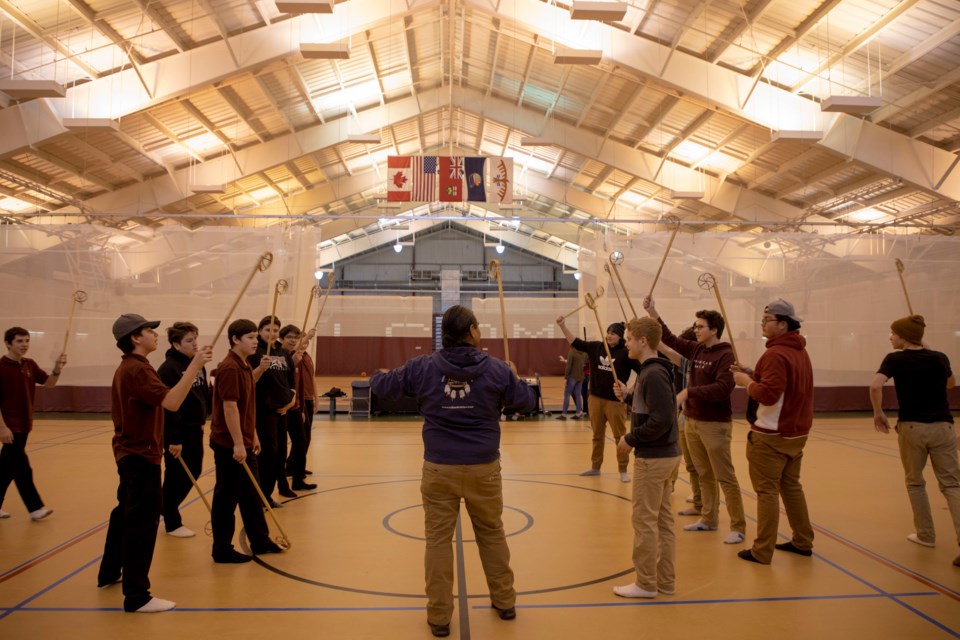NEWS RELEASE
ALGOMA UNIVERSITY
*************************
A large group of local secondary school students paid a visit to Algoma University and Shingwauk Kinoomaage Gamig (SKG) today to participate in a
day of activities associated with Algoma’s Bachelor of Arts degree in Anishinaabe Studies, the first degree of its kind in Canada.
“At Algoma University and at Shingwauk Kinoomaage Gamig, we were thrilled to receive ministerial consent this past Spring to offer the first-ever Anishinaabe Studies program in Canada,” said Algoma U Academic Dean, Dr. Donna Rogers.
“This new program is an attractive option for students seeking to develop cultural competency skills through cross-cultural dialogue and learning differing worldviews. We are confident it will attract students from the Algoma region, the rest of Ontario, and abroad. Even more importantly, SKG is one of the approved post-secondary Indigenous Institutes in the Province of Ontario, and will soon be the granting institution for this new Anishinaabe Studies degree.”
Secondary school students from the Algoma District School Board and the Huron Superior Catholic District School Board were invited to campus to learn more about the program while participating in a variety of related experiential learning activities including language and regalia workshops and traditional Anishinaabe games.
The new Anishinaabe Studies program explores the culture of the Anishinaabe Peoples (the original peoples of Turtle Island or North America). The program will teach students the history, philosophy, and worldview of the Anishinaabe, specifically the Ojibwe, Odawa, and Potawotami of the Three Fires Confederacy, whose traditional territory is located in both Canada and the United States, spanning from Quebec to Saskatchewan and into Michigan, Wisconsin, and Minnesota.
Through a culture-based curriculum, students will study introductory-level Anishinaabemowin (Ojibwe language). They will learn how colonization has led to subsequent social issues and significant contemporary movements in Anishinaabe society. The program will provide students with the opportunity to participate in the creation of solutions surrounding Anishinaabe-Canadian relations in today’s society.
The location of both Algoma and SKG provide a rich background for the program. Both institutions are located on the shores of St. Mary’s River at Bawating, a significant meeting site in the long history of the Anishinaabe.
Both are also located on the former sites of the Wawanosh and Shingwauk Indian Residential Schools, and work together to transform the negative legacy of the residential schools into a positive and healing experience for current Anishinaabe students and Survivors, aligned with Chief Shingwaukonse’s teaching wigwam of cross-cultural learning.
“On behalf of the Shingwauk Kinoomaage Gamig Board, I am extremely proud that we have received ministerial consent for the Anishinaabe Studies degree. This is a tremendous step forward for Shingwauk as an institution and for post-secondary education in our region,” said Lyle Sayers, Chair of the SKG Board and former Chief of Garden River First Nation. “As a descendant of Chief Shingwauk, I am so proud to see us taking this next step toward fully realizing his vision. Culture-based, Anishinaabe education is key to our future.”
“It makes my heart so happy that we are finally at this stage. When I was a student here in the residential school era, this place took my language and culture from me. Today, Shingwauk Kinoomaage Gamig is doing the hard work of restoring our ways of knowing, doing, being, and relating, returning our people to our knowledge. I am so proud of all that SKG has accomplished in partnership with Algoma U,” added Shirley Roach, SKG Board member and Shingwauk Indian Residential School Survivor.
The degree in Anishinaabe Studies will prepare graduates to work in a variety of sectors that interact with Anishinaabe Peoples, including social services, health services, law, government, among others.
Students in the program will take a cluster of courses in Anishinaabe Studies, as well as electives in related subjects. The program is interdisciplinary in nature, with core courses spanning numerous disciplines, including History, Law and Justice, Political Science, Social Work, Community Economic and Social Development (CESD), and English.
The new program will play a key role in fulfilling Algoma’s special mission and the Truth and Reconciliation Commision of Canada’s Calls to Action with regard to academic programming.
“We are incredibly proud to have reached this stage; it is important to remember that this degree program is accredited, not only by the Ontario Government, but also by the World Indigenous Nations’ Higher Education Consortium, meaning our program meets the highest standards set by both traditional Indigenous approaches to education and the systems of settler governments. We are excited to welcome students to the amazing new program,” said Mitch Case, Director of Student Services, Outreach and Resources at SKG.
For more information, please visit www.algomau.ca/anishinaabe-studies. To apply to the program, please visit www.algomau.ca/apply.
About Shingwauk Kinoomaage Gamig
Shingwauk Kinoomaage Gamig is committed to the restoration of the original spirit and intent of Chief Shingwauk, who envisioned a teaching wigwam where his people could acquire the necessary educational tools for life in modern society without compromising the values of our culture and traditions.
In cooperation with our partner Algoma University, we offer the Anishinaabemowin 3-year B.A. program and the newly accredited Anishinaabe Studies degree program. Shingwauk Kinoomaage Gamig is one of the nine Indigenous Institutes recognized by the Ontario Government in the Indigenous Institutes Act (2017) and is accredited by the World Indigenous Nation's Higher Education Consortium.
*************************
